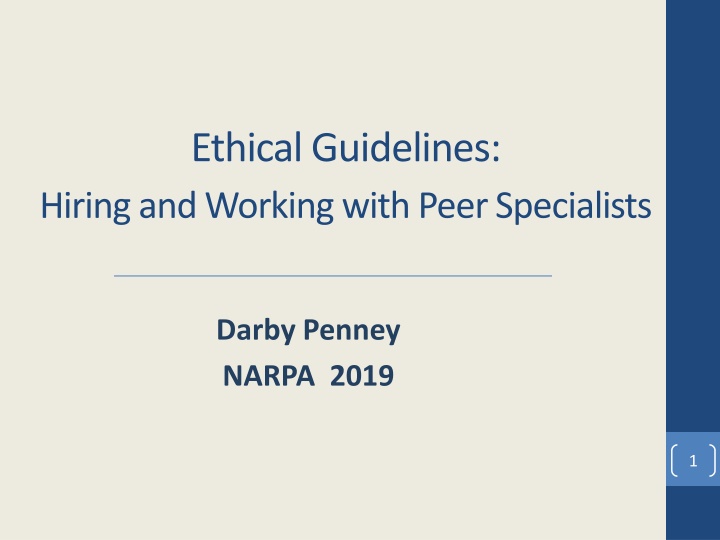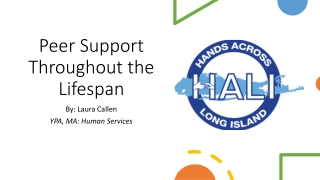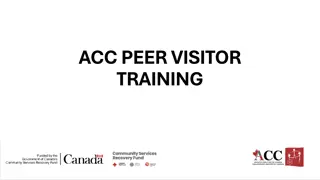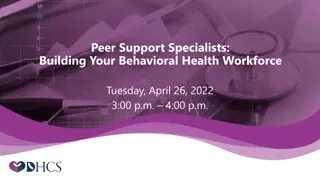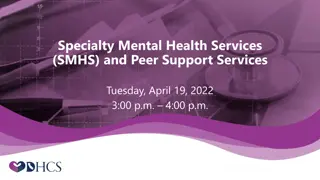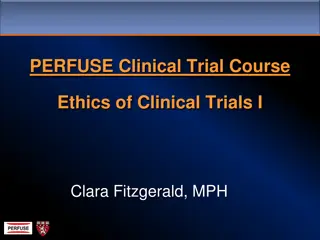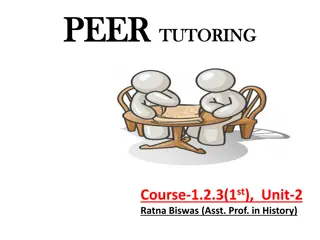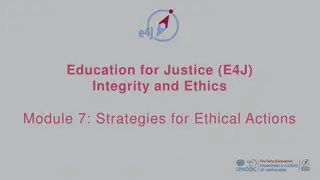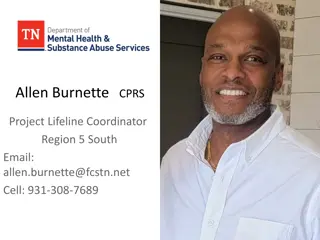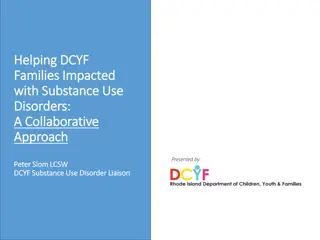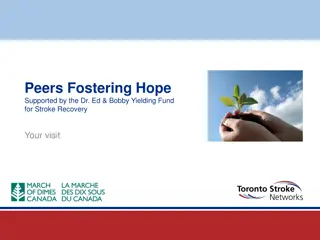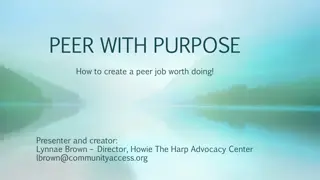Ethical Guidelines for Peer Specialists
Understanding the essence of peer support, the ethical guidelines for hiring and working with peer specialists, and the evolution of peer staff models over the years. Exploring the definitions and responsibilities of peer support within mental health and substance use recovery. Revealing insights from research literature on the roles and challenges faced by peer specialists in various programs.
Download Presentation

Please find below an Image/Link to download the presentation.
The content on the website is provided AS IS for your information and personal use only. It may not be sold, licensed, or shared on other websites without obtaining consent from the author.If you encounter any issues during the download, it is possible that the publisher has removed the file from their server.
You are allowed to download the files provided on this website for personal or commercial use, subject to the condition that they are used lawfully. All files are the property of their respective owners.
The content on the website is provided AS IS for your information and personal use only. It may not be sold, licensed, or shared on other websites without obtaining consent from the author.
E N D
Presentation Transcript
Ethical Guidelines: Hiring and Working with Peer Specialists Darby Penney NARPA 2019 1
What is Peer Support? It seems simple Peer Support An equal Shared demographic/ social position Similar life experiences/ challenges Empathy Encouragement Assistance Reciprocal relationship 2 Blanch, Filson, Penney & Cave, 2012; Penney, Prescott & Mead, 2009
Dueling Peer Support Definitions System of giving & receiving help among people with shared experiences, based on: Direct service delivered by a person with a serious mental illness to a person with a serious mental disorder 2 Respect Shared responsibility Mutual agreement of what is helpful NOT based on psychiatric models and diagnostic criteria 1 1. 2. Mead, 2003 Chinman et al, 2014 3
Beginnings of the Peer Staff Model 1986: Colorado Mental Health Consumer Case Manager Aide Program 1993: NY State Peer Specialist civil service job 1990: NIMH Grant- Peer Specialists on ICM teams, NYC 2001: Georgia Peer Specialist Certification 4
CMS Medicaid Letter - 2007 Federal Center for Medicare and Medicaid Services defined reimbursable Peer Support Services as: An evidence-based mental health model of care which consists of a qualified peer support provider who assists individuals with their recovery from mental illness and substance use disorders 5
Recent findings from the research literature Staff with psychiatric histories ( peer specialists ): Work in para-professional roles in traditional programs Often perform the same tasks as non-peer staff clinical and/or para-professional services clerical staff ; janitors; van drivers undefined roles that evolve based on perceived needs of the organization. Job descriptions vary: 6
More research findings Most peer workers not trained in peer support values & skills Pressuring clients for medication compliance Reporting clients behavior to clinicians Keeping case notes Assigned tasks may conflict with peer support values 7
More findings low pay insufficient hours negative/rejecting attitudes of non-peer staff treated as patients instead of colleagues Peer support staff face poor working conditions: 8
Peer support Peer-delivered services Peer-directed services Consumer services Peer worker Peer mentor Peer specialist Research studies use these terms interchangea bly 9
Studies used a range of confusing, incompatible definitions No one questioned whether what was under study was, in fact, peer support All conflated peer support with any service provided by someone working in a peer job 10
Lets be clear! Genuine peer support promotes dialectical inquiry in a quest for healing and growth Hiring people with psychiatric histories as paraprofessionals within traditional agencies tends to support the status quo 12
Advice for Policy-makers Anything called peer support must embody the values and principles of peer-developed peer support Peer Support is best provided through independent, peer- run organizations that are NOT affiliated with traditional mental health agencies 13
Discussion Is it possible to salvage the concept of genuine peer support in the context of rampant co-optation of peer specialists? Are there other options that might work better? 14
